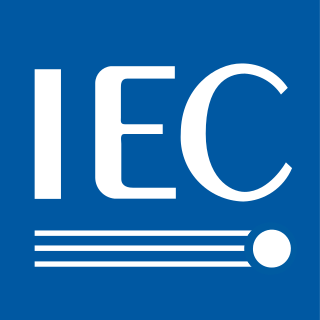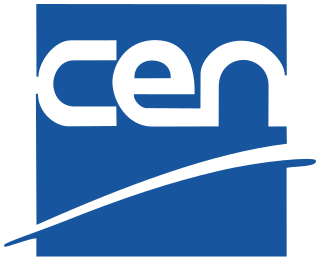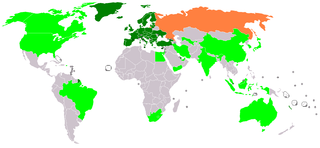Related Research Articles

The International Electrotechnical Commission is an international standards organization that prepares and publishes international standards for all electrical, electronic and related technologies – collectively known as "electrotechnology". IEC standards cover a vast range of technologies from power generation, transmission and distribution to home appliances and office equipment, semiconductors, fibre optics, batteries, solar energy, nanotechnology and marine energy as well as many others. The IEC also manages four global conformity assessment systems that certify whether equipment, system or components conform to its international standards.
Conformance testing — an element of conformity assessment, and also known as compliance testing, or type testing — is testing or other activities that determine whether a process, product, or service complies with the requirements of a specification, technical standard, contract, or regulation. Testing is often either logical testing or physical testing. The test procedures may involve other criteria from mathematical testing or chemical testing. Beyond simple conformance, other requirements for efficiency, interoperability, or compliance may apply. Conformance testing may be undertaken by the producer of the product or service being assessed, by a user, or by an accredited independent organization, which can sometimes be the author of the standard being used. When testing is accompanied by certification, the products or services may then be advertised as being certified in compliance with the referred technical standard. Manufacturers and suppliers of products and services rely on such certification including listing on the certification body's website, to assure quality to the end user and that competing suppliers are on the same level.

The 3rd Generation Partnership Project (3GPP) is an umbrella term for a number of standards organizations which develop protocols for mobile telecommunications. Its best known work is the development and maintenance of:

CENELEC is responsible for European standardization in the area of electrical engineering. Together with ETSI (telecommunications) and CEN, it forms the European system for technical standardization. Standards harmonised by these agencies are regularly adopted in many countries outside Europe which follow European technical standards. Although CENELEC works closely with the European Union, it is not an EU institution. Nevertheless, its standards are "EN" EU standards, thanks to EU Regulation 1025/2012.
A standards organization, standards body, standards developing organization (SDO), or standards setting organization (SSO) is an organization whose primary function is developing, coordinating, promulgating, revising, amending, reissuing, interpreting, or otherwise contributing to the usefulness of technical standards to those who employ them. Such an organization works to create uniformity across producers, consumers, government agencies, and other relevant parties regarding terminology, product specifications, protocols, and more. Its goals could include ensuring that Company A's external hard drive works on Company B's computer, an individual's blood pressure measures the same with Company C's sphygmomanometer as it does with Company D's, or that all shirts that should not be ironed have the same icon on the label.

The European Committee for Standardization is a public standards organization whose mission is to foster the economy of the European Single Market and the wider European continent in global trading, the welfare of European citizens and the environment by providing an efficient infrastructure to interested parties for the development, maintenance and distribution of coherent sets of standards and specifications.
Lawful interception (LI) refers to the facilities in telecommunications and telephone networks that allow law enforcement agencies with court orders or other legal authorization to selectively wiretap individual subscribers. Most countries require licensed telecommunications operators to provide their networks with Legal Interception gateways and nodes for the interception of communications. The interfaces of these gateways have been standardized by telecommunication standardization organizations. As with many law enforcement tools, LI systems may be subverted for illicit purposes.
European Standards, sometimes called Euronorm, are technical standards which have been ratified by one of the three European Standards Organizations (ESO): European Committee for Standardization (CEN), European Committee for Electrotechnical Standardization (CENELEC), or European Telecommunications Standards Institute (ETSI). All ENs are designed and created by all standards organizations and interested parties through a transparent, open, and consensual process.
Information security standards are techniques generally outlined in published materials that attempt to protect a user's or organization's cyber environment. This environment includes users themselves, networks, devices, all software, processes, information in storage or transit, applications, services, and systems that can be connected directly or indirectly to networks.
The Standards Council of Canada (SCC) (French: Conseil canadien des normes (CCN)) is a Canadian crown corporation with the mandate to promote voluntary standardization in Canada. The SCC is responsible for:

The European Cooperation for Space Standardization (ECSS) is a collaboration between the European Space Agency (ESA), the European space industry represented by Eurospace, and several space agencies, to develop and maintain a coherent, single set of user-friendly standards for use in all European space activities. Established in 1993 following a call by Eurospace to unify space products assurance standardization on a European level, it was officially adopted by the ESA on 23 June 1994 through the resolution ESA/C/CXIII/Res.1, to replace its own Procedures, Specifications and Standards (PSS) system. The ECSS currently has 139 active standards, forming the ECSS system. These standards cover management, engineering, product assurance, and space sustainability disciplines. The ECSS is managed by the ESA Requirement and Standard Division, based in the European Space Research and Technology Centre (ESTEC) in Noordwijk, the Netherlands. The ECSS maintains connections with multiple European and international standardization organizations, to contribute to standardization and to adopt relevant standards as part of the ECSS system.
The Global Standards Collaboration (GSC) started life as The Inter-regional Telecommunications Standards conference (ITSC) in 1990. This was an initiative of the T1 Committee of the United States who invited the other founding partner organizations ITU-T, ETSI and the Japanese TTC to the first ISC Meeting in Fredericksburg, VA. The goal was set by the “spirit of Melbourne”, stemming from a CCITT Plenary Assembly, to find a way of co-operation between Participating Standards Organizations (PSOs) from different regions of the world in order to facilitate global standardization within the ITU. The ITSC focussed its work on fixed telecommunications networks.

The European Telecommunications Standards Institute (ETSI) is an independent, not-for-profit, standardization organization operating in the field of information and communications. ETSI supports the development and testing of global technical standards for ICT-enabled systems, applications and services.
PAdES is a set of restrictions and extensions to PDF and ISO 32000-1 making it suitable for advanced electronic signatures (AdES). This is published by ETSI as EN 319 142.
ISO/IEC JTC 1/SC 7 Software and systems engineering is a standardization subcommittee of the Joint Technical Committee ISO/IEC JTC 1 of the International Organization for Standardization (ISO) and the International Electrotechnical Commission (IEC), that develops and facilitates standards within the field of engineering of software products and systems. The international secretariat of ISO/IEC JTC 1/SC 7 is the Bureau of Indian Standards (BIS) located in India.

The Cyprus Organisation for Standardisation, or CYS, is the national standardisation body of Cyprus, whose principal activity is the production of standards and the supply of standards-related services.
International Mobile Telecommunications-2020 are the requirements issued by the ITU Radiocommunication Sector (ITU-R) of the International Telecommunication Union (ITU) in 2015 for 5G networks, devices and services.
Araxxe is a French-based company that specialises in fraud related services. The two best known services are fraud detection and revenue assurance, typically offered to telecommunication companies. Araxxe is based in Lyon, France, and was founded in 2005.

oneM2M is a global partnership project founded in 2012 and constituted by 8 of the world's leading ICT standards development organizations, notably: ARIB (Japan), ATIS, CCSA (China), ETSI (Europe), TIA (USA), TSDSI (India), TTA (Korea) and TTC (Japan). The goal of the organization is to create a global technical standard for interoperability concerning the architecture, API specifications, security and enrolment solutions for Machine-to-Machine and IoT technologies based on requirements contributed by its members.
Abhay Karandikar is an Indian educator, engineer, innovator, and administrator best known for his work in the telecommunication sector in India. Currently, he is serving as the Secretary to the Government of India in the Department of Science and Technology, Government of India from 1 October 2023 onwards. Previously, he served as the Director of Indian Institute of Technology, Kanpur from 1 April 2018 to 30 September 2023. Prior to that, Karandikar held a number of positions, including Dean, Head of the Department of the Electrical Engineering, and Institute Chair Professor at the Indian Institute of Technology, Bombay. He was one of the founding members of Telecom Standards Development Society of India and appointed as its first Vice Chairman from 2014 to 2016, and then was appointed its Chairman from 2016 to 2018. Karandikar contributed to conceptualization and establishment of new technical standards work programmes for TSDSI. In 2016, he was awarded with IEEE SA's Standards Medallion for his work to Indian Technology, Policy and Standardization with IEEE guidelines.